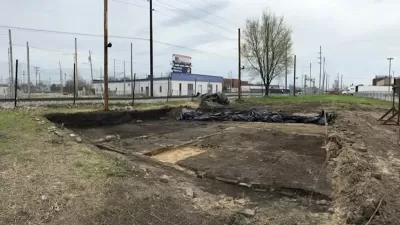Clare Foran unravels the relationship between misguided '70s-era planning efforts and ongoing racial tension in France.
A small town not far from the northern coast of France, Val-de-Reuil was established as one of nine New Towns intended to transform the overcrowding and suburban sprawl that plagued French cities in the late '60s and early '70s. Forty years on, however, it has yet to deliver on its promises.
"Today it’s one of the poorest cities in France," writes Foran, who formerly taught English there. "Rows of four and five-story, low-rent apartment complexes line the streets with balconies jutting out from their concrete facades... There is no discernible city center. The architecture of the buildings is modern, but not cutting edge and the city has a stark, uniform look to it. In a country that prides itself on history and tradition, Val-de-Reuil seems out of place – a town of boxy, geometric construction in the middle of the French countryside."
And while the reasons for its failure are worth considering (high unemployment due to industry-worker mismatch; a weak tax base due to socioeconomic segregation), more troubling is the way that such projects have reinforced racial tensions in a nation whose immigration policy is built on a platform of integration, "which calls for assimilation into French society, in speech, dress, culture, and custom."
"Val-de-Reuil isn’t a typical French town. To dismiss the city as an anomaly, however, would be a mistake. Val-de-Reuil embodies a central irony of French urban planning policy. City planners have built up isolated urban enclaves, like the Paris suburbs and the New Towns, which keep the country’s immigrant population separate from the rest of society, at the same time that the government calls for integration."
Foran recalls seeing these same tensions erupt in her own classroom, and hearing how minority children received them firsthand: "'You’re lucky that you live in the U.S.," [said one 12-year-old of Algerian descent]. 'Don’t you like living in France?' I asked. 'No,' he replied with grim certainty. 'People are racist here. They take one look and decide they don’t like you.'"
FULL STORY: How France Built Inequality Into Its Cities

Planetizen Federal Action Tracker
A weekly monitor of how Trump’s orders and actions are impacting planners and planning in America.

Restaurant Patios Were a Pandemic Win — Why Were They so Hard to Keep?
Social distancing requirements and changes in travel patterns prompted cities to pilot new uses for street and sidewalk space. Then it got complicated.

Map: Where Senate Republicans Want to Sell Your Public Lands
For public land advocates, the Senate Republicans’ proposal to sell millions of acres of public land in the West is “the biggest fight of their careers.”

Orange County, Florida Adopts Largest US “Sprawl Repair” Code
The ‘Orange Code’ seeks to rectify decades of sprawl-inducing, car-oriented development.

Maui's Vacation Rental Debate Turns Ugly
Verbal attacks, misinformation campaigns and fistfights plague a high-stakes debate to convert thousands of vacation rentals into long-term housing.

San Francisco Suspends Traffic Calming Amidst Record Deaths
Citing “a challenging fiscal landscape,” the city will cease the program on the heels of 42 traffic deaths, including 24 pedestrians.
Urban Design for Planners 1: Software Tools
This six-course series explores essential urban design concepts using open source software and equips planners with the tools they need to participate fully in the urban design process.
Planning for Universal Design
Learn the tools for implementing Universal Design in planning regulations.
Heyer Gruel & Associates PA
JM Goldson LLC
Custer County Colorado
City of Camden Redevelopment Agency
City of Astoria
Transportation Research & Education Center (TREC) at Portland State University
Camden Redevelopment Agency
City of Claremont
Municipality of Princeton (NJ)





























